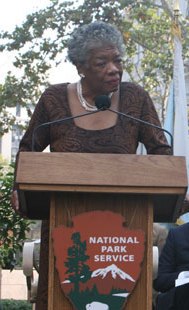Yesterday the world said good-bye to an icon of American literature. Maya Angelou is best remembered for her memoir, I Know Why The Caged Bird Sings. Much has already been written about Maya’s turbulent, early years and her rise to phenomenal success in the arts, literature and political activism. Many young people met Maya through her memoir, which was required reading in high schools, and for decades, Maya continued to educate us with her wisdom and mesmerize us with the magic of her words.
As a writer, I am always looking for words that stir my soul, quicken my pulse and thrill me beyond measure. Maya Angelou’s writing does that to me. This excerpt, taken from the poem Still I Rise is one of my favorites, and I daresay, the favorite of many:
Out of the huts of history’s shame
I rise
Up from a past that’s rooted in pain
I rise
I’m a black ocean, leaping and wide,
Welling and swelling I bear in the tide.
Leaving behind nights of terror and fear
I rise
Into a daybreak that’s wondrously clear
I rise
Bringing the gifts that my ancestors gave,
I am the dream and the hope of the slave.
I rise
I rise
I rise.
Gifted person that she was, Maya has left us a treasure trove of words that we as writers can live by. As I reflect on the life and passing of this “great light,” her words inspire me to remember that my beginning does not dictate my end. Maya’s light shines on.

Related articles











